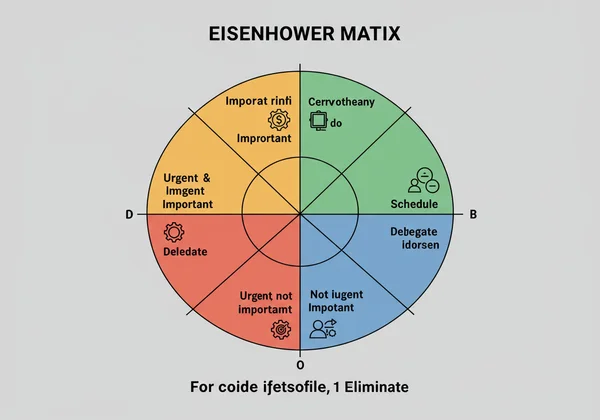How to Improve Time Management Skills: 10 Proven Techniques for Better Productivity
Feeling constantly overwhelmed, with a to-do list that never seems to shrink? You're not alone. In a world of endless distractions and demands, mastering your time is more crucial than ever. The good news is that it's a skill you can develop. If you're ready to stop feeling busy and start being productive, learning how to improve your time management skills is the first step.
This guide moves beyond generic advice to give you ten proven, actionable time management techniques. By implementing these strategies, you can boost your productivity, dramatically reduce stress, and finally take control of your schedule.
The Foundation: Why Time Management Matters
Effective time management isn't about squeezing every last second out of your day. It's about making conscious choices to advance your most important goals. Good skills in this area lead to:
-
Reduced Stress: A clear plan eliminates the anxiety of what to do next.
-
Increased Productivity: You accomplish more in less time by focusing on high-impact tasks.
-
Better Work-Life Balance: By being efficient at work, you create more space for your personal life.
-
Improved Focus: You train your brain to concentrate on the task at hand, which is key to focus management.

10 Actionable Time Management Techniques
Forget vague tips. Here are ten specific methods you can start using today to transform how you work.
1. Prioritize with the Eisenhower Matrix
Not all tasks are created equal. The Eisenhower Matrix helps you categorize tasks based on urgency and importance.

- Urgent & Important: Do these tasks immediately.
- Important, Not Urgent: Schedule these tasks to do later. This is where you should spend most of your time.
- Urgent, Not Important: Delegate these tasks if possible.
- Not Urgent, Not Important: Eliminate these tasks.
2. Master Your Schedule with Time Blocking
Time blocking is the practice of scheduling out every part of your day. Instead of working from a to-do list, you assign specific blocks of time on your calendar to tasks. This proactive approach ensures that your priorities get the attention they deserve.
3. Use the Pomodoro Technique
This technique uses a timer to break down work into focused 25-minute intervals, separated by short breaks. It’s an incredibly effective way to maintain high levels of concentration and prevent burnout—a cornerstone of good focus management.
4. Beat Procrastination with the Two-Minute Rule
Popularized by David Allen, this rule states: "If a task takes less than two minutes to complete, do it immediately." This simple trick prevents small tasks (like replying to an email or making a quick call) from piling up and becoming a source of mental clutter. It's one of the best productivity tips for those wondering how to stop procrastinating.
5. "Eat the Frog" First
This technique, coined by Brian Tracy, means tackling your most challenging and important task (your "frog") first thing in the morning. Completing it gives you a sense of accomplishment and momentum that carries you through the rest of the day.
6. Boost Efficiency by Batching Similar Tasks
Context switching—jumping between different types of work—drains your mental energy. Instead, group similar tasks together and do them in one batch. For example, set aside a specific block of time to answer all your emails, another to make phone calls, and another for creative work.
7. Set SMART Goals
You can't manage your time effectively if you don't know what you're working towards. Set goals that are Specific, Measurable, Achievable, Relevant, and Time-bound. Clear goals provide direction and make prioritization much easier.
8. Minimize Digital Distractions
Your smartphone and email inbox are major productivity killers. Take control by turning off non-essential notifications, setting specific times to check email, and using apps or browser extensions to block distracting websites. For more on this, check out our guide to digital focus tools.

9. Conduct a Weekly Review
Set aside 30 minutes at the end of each week to review what you accomplished, what went well, and what challenges you faced. This moment of reflection is crucial for refining your strategies and planning the week ahead with intention.
10. Learn the Power of "No"
One of the most advanced time management techniques is learning to politely decline requests that don't align with your goals and priorities. Protecting your time is not selfish; it's essential for achieving what truly matters to you.
Start Small, Win Big
You don't need to implement all ten of these techniques at once. The journey of learning how to improve time management skills is a marathon, not a sprint.
Start by choosing just one or two methods that resonate with you. Practice the Two-Minute Rule for a week, or try time blocking for a single day. As you build confidence and see results, you can gradually incorporate more strategies into your routine. With consistent effort, you'll build a powerful system that reduces stress and unlocks your full productive potential.
What's the first technique you're going to try? Share your choice in the comments below!
Frequently Asked Questions
Q1: What is the most effective time management technique?
A: The "most effective" technique varies from person to person. However, many experts agree that methods combining prioritization and focus, like using the Eisenhower Matrix to decide what to do and the Pomodoro Technique to actually do it, are extremely powerful.
Q2: How can I stop procrastinating for good?
A: Stopping procrastination involves understanding its root cause, which is often fear or feeling overwhelmed. Techniques like the "Two-Minute Rule" (for small tasks) and "Eat the Frog" (for big tasks) are excellent starting points. Breaking large projects into small, manageable steps also makes them less intimidating.
Q3: How long does it take to get better at time management?
A: Like any skill, it takes consistent practice. You can see noticeable improvements in your focus and sense of control within a few weeks of consistently applying techniques. Mastering them and making them an unconscious habit can take a few months, but the immediate benefits are a great motivator.